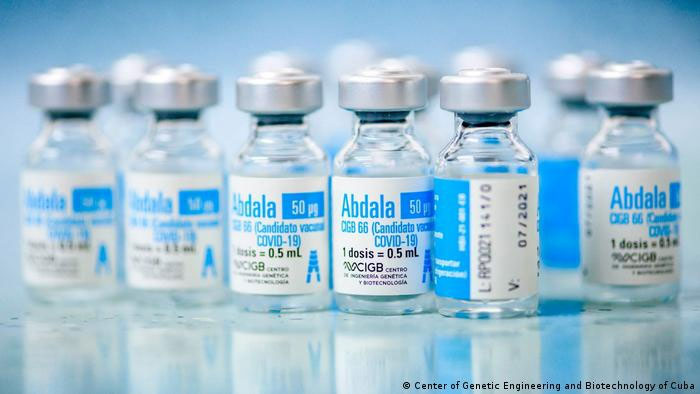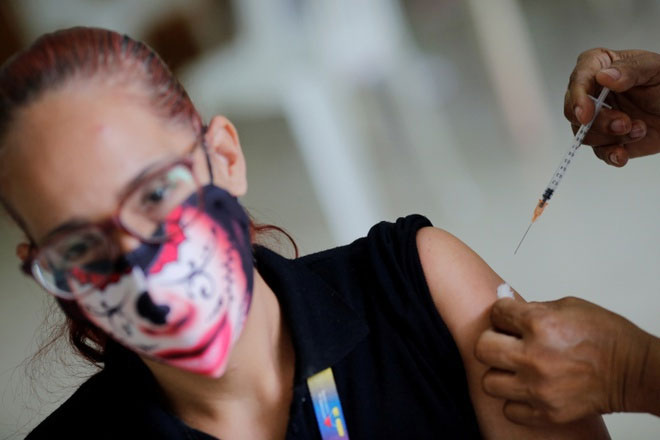The recommended age for use and dosage are two key updates in the Ministry of Health’s guidelines for the Abdala Covid-19 vaccine.
The Abdala vaccine, produced by Cuba, is the eighth Covid-19 vaccine approved for use in Vietnam, alongside AstraZeneca (produced by AstraZeneca, UK-Sweden), Sputnik V (Gamaleya Research Institute, Russia), Janssen (Johnson & Johnson, USA), Spikevax (Moderna, USA), Comirnaty (Pfizer-BioNTech, USA), Vero Cell (Sinopharm, China), Hayat-Vax (China-UAE), and Abdala (Cuba).
On October 24, the Ministry of Health released guidelines for the use of this vaccine. Compared to the other seven vaccines, the recommendations and usage conditions for Abdala have two key differences.
The only Covid-19 vaccine designated for 3 doses
According to the Ministry of Health’s guidelines, the vaccination schedule for this vaccine consists of 3 doses, with a 14-day interval between doses. Each dose is 0.5 ml administered intramuscularly. This is the only Covid-19 vaccine in Vietnam that is recommended for 3 doses instead of the two doses or a single dose (Janssen) as with previous vaccines.
Abdala is a Covid-19 vaccine that contains a recombinant protein active ingredient that interacts with the human ACE2 receptor. This vaccine is produced at AICA Laboratories, Base Business Unit (BBU) AICA – Cuba, and is packaged for sale at the Center for Genetic Engineering and Biotechnology (CIGB) – Cuba.
Abdala is formulated based on a protein vaccine. It carries a portion of the mutated protein that the virus uses to bind to human cells, thereby generating neutralizing antibodies that prevent this binding process. According to medical information sources like PubMed and Precision Vaccinations, Abdala is a subunit vaccine, formulated based solely on a fragment of the receptor binding domain (RBD) of the SARS-CoV-2 spike protein. Scientists used the yeast Pichia pastoris for the receptor binding domain.

Abdala is the only Covid-19 vaccine permitted for 3 doses in Vietnam. (Photo: Center of Genetic Engineering and Biotechnology of Cuba).
In June, the Cuban state pharmaceutical group BioCubaFarma announced that the domestically produced Abdala Covid-19 vaccine had an efficacy of 92.28% in late-stage clinical trials. This information places the Abdala vaccine alongside the most effective vaccines currently available, such as BioNTech/Pfizer and Moderna.
Furthermore, in mid-August, Cuba released additional data indicating that “only 21,000 people” (or 0.8%) out of 2.5 million vaccinated with this vaccine have contracted the disease to date. Among the 21,000 people who contracted the virus after vaccination, 99 (0.003%) died. However, the exact number of children participating in this trial and the efficacy in different age groups has not been disclosed by the company.
Only for ages 19-65
In Cuba, Abdala is one of two Covid-19 vaccines administered to children aged 2 and older. However, Abdala is only administered to individuals aged 19 and older, specifically within the 19-65 age group. In contrast, the other vaccines can be administered to individuals aged 18 and older.
Thus, individuals under 18 years old and over 65 years old in Vietnam will receive one of the other seven approved vaccines. Currently, the Ministry of Health has no information regarding mixing the Abdala vaccine with other types.
Additionally, the Ministry of Health’s guidelines contraindicate the administration of Abdala to individuals who are sensitive to any component of the vaccine (including thiomersal).

A woman in Venezuela receiving the Abdala vaccine on July 1. (Photo: Reuters).
Precautions for administering this vaccine include:
- Individuals with chronic diseases, autoimmune disorders, or metabolic endocrine diseases: Should be evaluated before vaccination.
- Individuals with hypertension should postpone vaccination until their blood pressure is controlled.
- Individuals currently experiencing acute infections should postpone the Abdala vaccine until the infection is resolved.
According to the Ministry of Health’s guidelines, for pregnant women, experience with this vaccine is limited. Animal studies have shown that the vaccine does not directly or indirectly affect pregnancy, fetal development, or the mother during or after childbirth. The administration of the Abdala vaccine during pregnancy should be considered if the benefits outweigh the potential risks to the mother and fetus.
Moreover, the Ministry of Health noted that adverse reactions to the Abdala vaccine are rarely reported. Mild post-vaccination reactions account for 97% of post-vaccination responses and do not require medication, typically occurring 24 to 48 hours after vaccination. Adverse effects are more common after the first dose and decrease with subsequent doses.
Clinical trials using 215,267 doses showed very few adverse events, ranging from 0.1% to 1% of total doses administered. Local reactions were primarily observed. Most were pain at the injection site, redness, and hardness (0.85%).
Systemic reactions included headaches (0.54%), hypertension (0.27%), drowsiness (0.18%), and fatigue (0.14%). Reactions such as nausea, vomiting, joint pain, and general discomfort occurred less frequently (0.1%).
With over 3 million doses administered in the community, Abdala has reported very few cases of anaphylaxis, with no deaths or other serious side effects related to vaccination.


















































